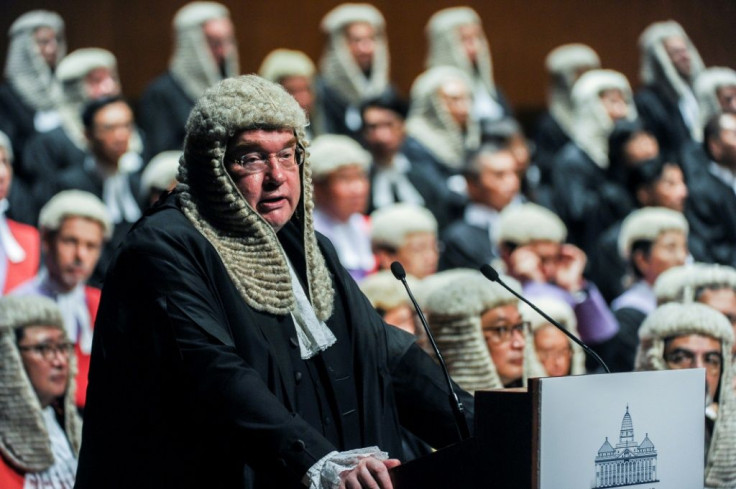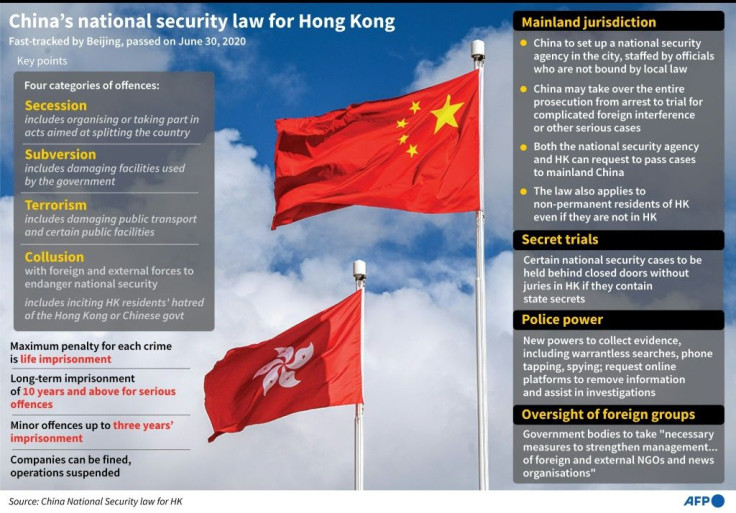Hong Kong Bar Association 'Gravely Concerned' By Security Law
A sweeping new security law imposed on Hong Kong by Beijing undermines the semi-autonomous city's independent judiciary and stifles freedoms, the city's influential Bar Association has warned.
In a scathing critique, the group detailed how the new law dismantles the legal firewall that has existed between Hong Kong's independent judiciary and China's Communist Party-controlled courts since the 1997 handover.
The legislation outlawing acts of subversion, secession, terrorism and colluding with foreign forces was passed on Tuesday in Beijing, bypassing Hong Kong's legislature, its wording kept secret until it was enacted later that day.
The unprecedented move has sent a wave of fear through the city, sparked international criticism and rattled the legal community in a business hub that has built its reputation on the independence and reliability of its courts.
In a five-page analysis, the Bar Association said the new national security offences were "widely drawn" and "are capable of being applied in a manner that is arbitrary, and that disproportionately interferes with fundamental rights, including the freedom of conscience, expression and assembly".
"In addition to the total absence of meaningful consultation, lawyers, judges, police and Hong Kong residents were given no opportunity to familiarise themselves with the contents of the new law, including the serious criminal offences it creates, before it came into force," the analysis added.

Under a deal ahead of the handover from Britain, authoritarian China guaranteed Hong Kong civil liberties as well as judicial and legislative autonomy until 2047 in a formula known as "One Country, Two Systems".
Critics -- including Britain -- say the new law demolishes that deal, especially as China says it will have jurisdiction over some cases and has empowered its security agents to operate openly inside Hong Kong for the first time.
It has also claimed global jurisdiction, saying the law covers national security offences committed overseas -- even by foreigners.
The Bar Association said the law makes clear "suspects can be removed to face trial in Mainland China" and points out that the process does not have the usual checks and balances of extradition hearings.

Instead, it looks more like rendition -- when a person is simply taken to another jurisdiction.
It noted the law allowed mainland security agents working in Hong Kong to be "above the reach of local law" and said empowering the city's chief executive to appoint judges to oversee national security cases undermined judicial independence.
Local police have been granted wider surveillance powers to monitor suspects, including wiretapping, without a judge's approval, the association added.
It also expressed concern that some national security trials could be heard behind closed doors, without juries, and that Beijing -- not Hong Kong's courts -- has final say interpreting the new law.
The analysis parsed Beijing's description of the four new crimes and how they might outlaw certain views and acts.
The definition of secession, for example, can be committed without violence.
"This gives rise to concern whether this might operate to prohibit mere speech or any peaceful advocacy," the association said.
On Wednesday the first arrests were made under the new law -- most for people carrying flags or leaflets supportive of Hong Kong independence, or chanting slogans.
Terrorist acts were "vaguely defined" and could include people who unknowingly provided material or financial support to someone who later went on to commit an act that is declared terrorist in nature.
Colluding with foreign forces was also "vaguely defined", the association said, covering "accepting a subsidy or support from a foreign organization with a view to carrying out hostile actions against the (Hong Kong government).
"This gives rise to concern whether certain existing activities of academics, NGOs and media organizations which were lawful or not unlawful in the past might now be outlawed by these provisions," the association said.
The bar association is one of Hong Kong's most respected and influential legal associations, representing and regulating the city's barristers.
© Copyright AFP 2024. All rights reserved.




















